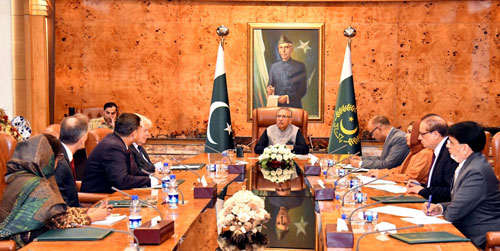President Dr Arif Alvi Tuesday said that Pakistan needed comprehensive disease prevention and early detection disease health eco-system to counter communicable and non-communicable diseases which would provide better healthcare to the people and help reduce the burden on the country’s overstrained curative health system.
The president made these remarks while talking to a delegation of the Royal College of Physicians UK led by Prof. Charles Twort, Chair Membership of Royal College of Physicians (MRCP) Examinations, UK, who called on him, at Aiwan-e-Sadr.
The president expressed the need for strengthening collaboration with the Royal College of Physicians (RCP), UK to bring about a fundamental change in the quality and standards of the healthcare system of Pakistan.
Such collaboration would provide cutting-edge quality healthcare to the people of Pakistan and help meet the WHO 2030 targets, he added.
He further emphasized that the MRCP exam was an important opportunity for medical students to improve their clinical examination, communication skills with patients and diagnosis interpretation. He said with concern that the estimated 24% of our population was facing mental health conditions which were causing stress and tension in society, besides increasing the vulnerability of the stressed population to resort to drug use, violence and extreme behaviors.
While commending the Future Hospital Pakistan Programme of the Royal College of Physicians, the president stressed the need for forging better cooperation and sharing of best practices amongst the renowned medical educational institutions and hospitals of the country for the provision of high-quality health services to the people of Pakistan.
He also appreciated Professor Aamir Ghafoor Khan for being the first Pakistan-based physician to be awarded the Practical Assessment of Clinical Examination Skills (PACES) Champion Award for the year 2021-2022.Prof. Charles Twort, Chair MRCP-UK Exam, Royal College of Physicians informed the president that RCP was working with partners in Pakistan under the future hospital Pakistan programme, which was an entirely modern model of integrated healthcare support aimed at enhancing patient care in hospitals and community settings.










